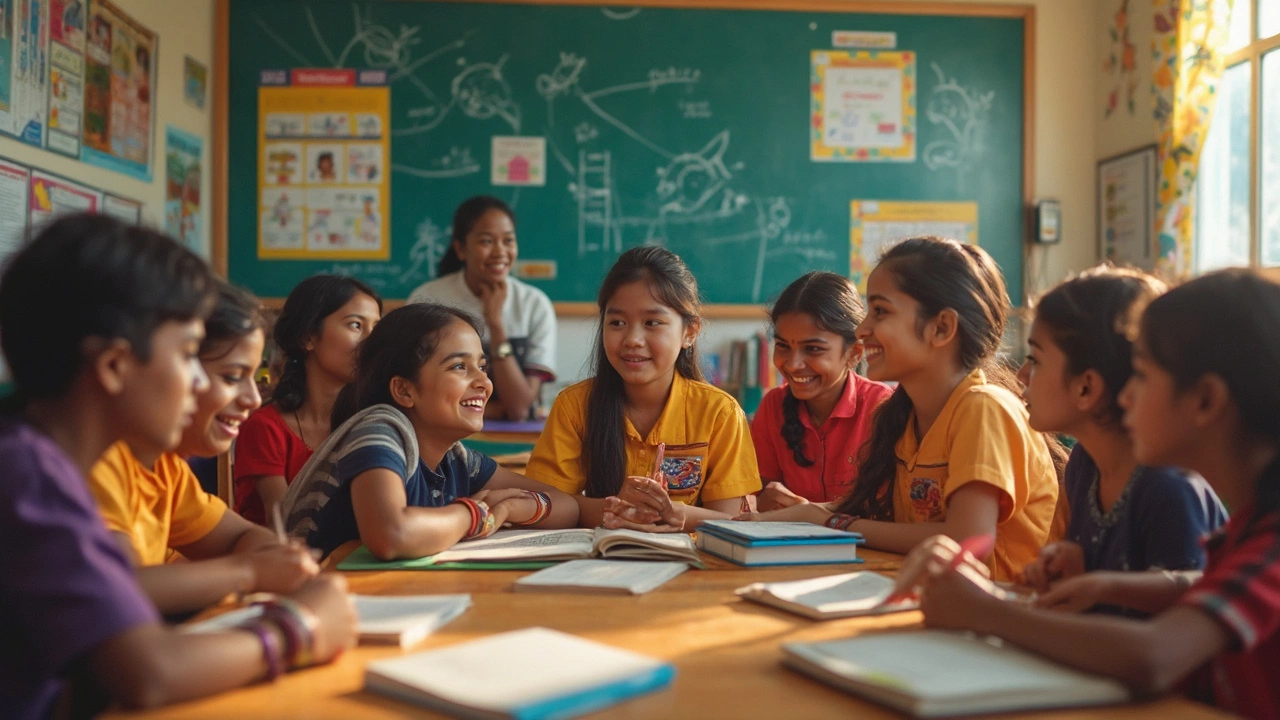Choosing the right syllabus for your child isn't exactly an easy decision, right? If you've been scratching your head over this, you're in good company. Among the many curricula out there, the Central Board of Secondary Education (CBSE) often pops up in discussions. So, what's the fuss all about? Is CBSE really one of the best out there?
First things first, the CBSE isn't just any curriculum. It's designed to foster understanding and application of knowledge rather than rote memorization. This means kids not only learn facts but also understand their relevance. This approach is great for developing critical thinking skills, which are super important for navigating today's world.
Over the years, CBSE has managed to strike a balance between maintaining robust academic standards and incorporating practical knowledge. Folks often highlight its streamlined and consistent evaluation system, which really helps in reducing student stress levels. With its wide range of subjects and activities, students get to explore diverse interests while keeping their education holistic but not overwhelming.
- What Makes CBSE Stand Out
- Global Appeal of CBSE
- Tips for Maximizing CBSE Advantages
- Comparing CBSE with Other Syllabuses
What Makes CBSE Stand Out
When it comes to education, picking the right curriculum can honestly feel like a big deal. Among the crowd, the CBSE syllabus grabs a lot of attention for a bunch of good reasons.
Student-Centered Learning
CBSE is built around the idea that every student can shine. It emphasizes student-centered learning, encouraging kids to think critically and independently. This isn’t just about dumping information into young minds; it's about shaping thinkers who can tackle challenges smartly.
Uniformity and Recognition
One of CBSE's selling points is its uniformity. This means if a family relocates within India or even abroad, the kids won’t have to face abrupt academic changes. The education consistency is great, reducing the anxiety of catching up or missing out. Oh, and speaking of abroad, CBSE is recognized globally. So if you're thinking about future higher education opportunities, this board sets a solid footing.
Focus on Core Subjects
CBSE usually focuses more on math and science subjects, which is particularly appealing to those who are eyeing professions in engineering or medicine. It sticks closely to the National Council of Educational Research and Training (NCERT) guidelines, known for their clear, concise textbook materials.
Skill-Based Approach
Another cool thing is the curriculum’s tilt towards skill-based learning. It integrates life skills, values, and co-curricular activities. It's not just about cracking exams but becoming a well-rounded individual ready for life’s hurdles.
Balanced Assessment System
Exams can stress anyone out, right? CBSE’s assessment system is crafted to ease that burden a bit. The board uses a mix of formative and summative assessments to evaluate students' progress throughout the year, not just one-off written exams. Plus, they stress on applying real-world scenarios in exams, which can help in understanding how stuff works outside the textbook.
The focus on quality, adaptability, and comprehensive development truly makes CBSE stand out in the world of education choices.
Global Appeal of CBSE
Ever noticed how CBSE isn't just popular in India but has fans worldwide? There's a good reason for that. The CBSE syllabus is crafted to meet international standards, making it easier for students to adapt if they move abroad or wish to apply to universities outside India.
One of the standout features is its uniformity and established credibility. CBSE schools are spread over 28 countries, catering to a diverse set of learners. This global presence is a testament to its adaptable and comprehensive nature.
Language and Structure
Another reason students and parents love CBSE is its focus on the English language, which is increasingly seen as a global lingua franca. The emphasis on English alongside regional languages helps students gain linguistic benefits from both world views.
Preparing for Global Competitions
Many international competitions and standardized tests, like SATs or Olympiads, align well with the CBSE framework. This alignment is because the syllabus emphasizes analytical skills and practical applications, which are also a focus in global education standards.
Also, subjects are taught in a way that encourages critical thinking and problem-solving, vital skills sought after by international employers.
Statistical Edge
Here's a quick look at some stats that show CBSE's global footprint:
| Region | Number of CBSE Schools |
|---|---|
| Middle East | 170 |
| North America | 30 |
| Asia-Pacific | 55 |
| Africa | 20 |
With a broad network and a consistent academic framework, students growing up studying the CBSE syllabus can adapt easily to different cultural and educational backgrounds, giving them a leg up in their future endeavors. Isn't it comforting to know there's a strong support system underpinning the education of your kid, no matter where you decide to live?

Tips for Maximizing CBSE Advantages
If you're already on board with the CBSE syllabus, you might be wondering how to make the most of it for your child. Here are some straight-talk tips to help you navigate the system like a pro.
Understand the Curriculum Structure
Begin by getting a handle on the CBSE's structure. It’s more than just textbooks; it’s about concepts. Crack open those books and look for the real-world applications of the theory. Schools often provide overviews for each course – make sure you snag those!
Dive into Continuous Assessments
CBSE is known for its continuous assessment pattern, which can be less nerve-wracking for students. Encourage your kid to consistently engage with class projects and assignments. These small steps will ease the pressure during final exams and build a stronger grasp of the concepts.
Take Advantage of Extracurricular Activities
The CBSE curriculum offers a ton of extracurricular options. These are golden for developing well-rounded skills. From science clubs to sports and arts – your child can explore interests outside the regular syllabus.
Seek Professional Coaching for Core Subjects
If your child struggles with a particular subject, consider professional coaching. Anaya, my little one, greatly benefited from extra math lessons!
"A focus on understanding over memorization not only enhances academic performance but also builds lifelong learners," says Dr. Priya Jain, a renowned educationist.
Utilize Online Resources
The internet is your friend. There are countless websites and channels out there offering detailed explanations and quizzes tailored to CBSE standards. This approach is engaging and caters to different learning styles.
- Make a schedule for study and fun – balance is key!
- Join community groups or forums to stay updated on any CBSE changes.
- Encourage self-study routines that suit your child’s pace.
Stay Updated with Past Papers
Past exam papers are a treasure trove for understanding question patterns. Encourage using them for practice. It’s like a dress rehearsal for the main event!
Comparing CBSE with Other Syllabuses
When we talk about educational choices, it’s not just about picking a school; it’s about picking a curriculum that’ll shape how kids learn and think. So, what sets the CBSE syllabus apart from the rest?
CBSE vs. ICSE
First up, ICSE. It’s another major player in India’s education scene. Now, the big difference here is in their approach. While the CBSE syllabus tends to focus more on science and math with an emphasis on analytical skills, ICSE dives deep into languages and arts, offering a more well-rounded framework.
CBSE vs. State Boards
When we look at state boards, they often have syllabuses that cater to regional needs, including regional languages. But, one thing to remember is that the CBSE syllabus can offer a more standardized education across the country. So if your family moves a lot, CBSE could be a smoother journey for your kid.
CBSE vs. International Boards
International syllabuses like IB (International Baccalaureate) and IGCSE (International General Certificate of Secondary Education) are all about global exposure and inquiry-based learning. They're recognized worldwide. But, here's the scoop: CBSE schools usually have a broader availability in India and the exams are more direct, focusing on mastering the subject competencies deeply rather than broad project-based work.
Here's a little breakdown to give you a quick snapshot:
| Metric | CBSE | ICSE | State Boards | International Boards |
|---|---|---|---|---|
| Focus | Science & Math | Languages & Arts | Regional Relevance | Inquiry-based Learning |
| Recognition | National | National | State | Global |
| Flexibility | High | Medium | Variable | High |
So there you have it! Each syllabus comes with its own perks and quirks. Understanding these can really make a difference in finding the right fit for the child’s educational needs.
